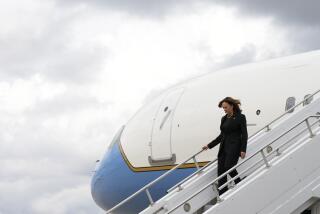Over-protecting POTUS?
For people who want to protest government policy, a public appearance by the president is an opportunity to exercise their right to free speech. For the Secret Service, however, demonstrators (and others who crowd around the chief executive) are potential assassins. Reconciling the 1st Amendment and the need to protect the president is a challenge, but over the years the Secret Service and local police have developed ways to allow critics and supporters alike to catch the president’s eye or ear without posing a threat to his safety. But what if agents use security as a pretext to ensure that the only voices a president hears are friendly ones?
That is allegedly what happened during the 2004 presidential campaign when both supporters and opponents ofGeorge W. Bushgathered near an inn in Jacksonville, Ore., where the president was having dinner. According to a federal civil rights lawsuit, two Secret Service agents directed police to push about 300 anti-Bush demonstrators farther away from the president’s location while allowing Bush supporters to remain in the vicinity. As a result, the protesters claim, only the president’s well-wishers were able to line the route of Bush’s motorcade when he left the restaurant.
The agents contend that they directed police to move the anti-Bush demonstrators so they wouldn’t be in handgun or explosive range of the president. The protesters say the real purpose was to prevent Bush and the media from seeing or hearing their message. If that was the case, the agents’ action was an obvious violation of the 1st Amendment’s prohibition of what the Supreme Court calls “viewpoint discrimination,” which occurs when the government censors some opinions but not others. The agents asked a federal court to dismiss the suit, but last week the U.S. 9th Circuit Court of Appeals rightly ruled that the protesters’ 1st Amendment lawsuit contains “plausible” assertions of illegality and can go forward.
The appeals court conceded that the agents reportedly had told police that the protesters had to be moved so they weren’t in gunshot range of the president. But the fact that pro-Bush demonstrators were permitted to remain alongside the president’s motorcade was, it said, “quite relevant in assessing whether a reasonable agent could have believed the direction to relocate the anti-Bush protesters was consistent with the 1st Amendment.”
This decision is important beyond the case at hand. Three years ago, in dismissing a discrimination lawsuit against Bush administration officials by a Muslim man imprisoned after9/11, the Supreme Court took an exacting view of whether an initial pleading is plausible enough to go forward — so exacting that it seemed to some observers to be creating a situation in which a case couldn’t proceed to trial unless the plaintiffs offered the sort of proof that is generally not offered until the trial itself. The 9th Circuit decision in the Bush protest case takes a more sensible view, one that gives both aggrieved citizens and public officials their day in court.
More to Read
A cure for the common opinion
Get thought-provoking perspectives with our weekly newsletter.
You may occasionally receive promotional content from the Los Angeles Times.










